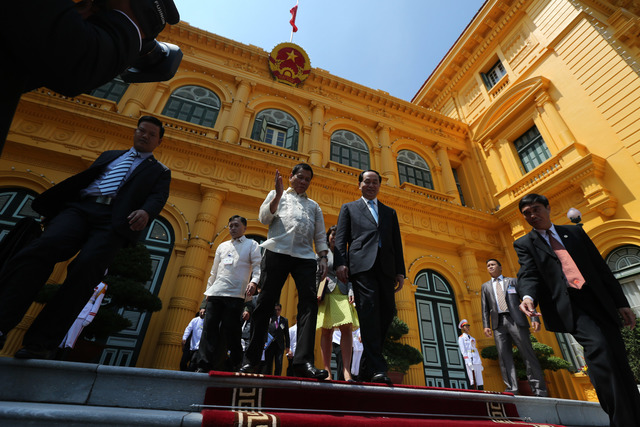President Rodrigo Duterte and Vietnam President Tran Dai Quang agree to avoid 'provocative acts' in the South China Sea

OFFICIAL VISIT. President Rodrigo Duterte exchanges pleasantries with Vietnamese President Tran Dai Quang following their bilateral meeting at the State Palace in Hanoi on September 29. KING RODRIGUEZ/PPD
President Rodrigo Duterte on Thursday, September 29, explained to Vietnam President Tran Dai Quang why he believes it is necessary for the Philippines to have bilateral talks with China on the West Philippine Sea (South China Sea) dispute.
Duterte did this during his bilateral meeting with Quang on the second day of his official visit to this country, according to Philippine officials who attended the meeting.
Vietnam, for its part, pushed for both multilateral and bilateral means to resolve the dispute, a member of Duterte's delegation said.
"Bilateral engagements with China (are) necessary in this respect because the arbitration tribunal's decision has no enforcement capability or mechanisms on its own," Foreign Secretary Perfecto Yasay Jr told Philippine media, when asked about the outcome of the bilateral meeting held at the State Palace.
"The President expressed that his bilateral talks with China is a necessity because he has to feel them out first," said Senator Alan Peter Cayetano, part of the Philippine delegation as Senate committee on foreign relations chairman. (READ: Duterte expects bilateral talks with China to start 2016)
"Ang kanyang appeal is kung problema natin baka kaya nating i-solve na tayo-tayo. (His appeal was that if it's our problem, maybe we can solve it among ourselves). We thank and respect foreign powers, world powers, but isn't it better if we open doors and start talking?" said Cayetano.
The Philippines, even under the Aquino administration, has always eyed bilateral talks after getting a favorable decision on its case against China. Manila's legal victory is viewed as a leverage against Beijing, which dwarfs the Philippines in terms of economic and military might.
Vietnam, for its part, is known to favor multilateral talks to resolve the South China Sea dispute. It too is claiming parts of the disputed sea.
Like the Philippines, Vietnam has experienced aggression from China. In May 2014, Beijing's announcement that it would move its deep-water drilling rig in contested waters triggered violent anti-China protests in Vietnam that later prompted China to evacuate 3,000 of its nationals from that country.
Yasay said the Philippines and Vietnam positions on the dispute are "convergent" and are not conflicting. The presidents of both countries agreed on their commitment to the rule of law and pursuing "legal and diplomatic processes" for the peaceful settlement of disputes.
Both leaders also agreed to avoid "provocative acts."
"We should be more restrained in our deportment in our actions to make sure we do not do any provocative acts that would undermine the peaceful settlement of these disputes," said Yasay.
ASEAN and Duterte's 'ace card'
But it seemed Vietnam leaders also pushed for multilateral talks during the meeting, at least according to Cayetano's account.
"Vietnam said we should do this (settlement of maritime disputes) through the principles of ASEAN (Association of Southeast Asian Nations), and we should have multilateral and bilaterals through the ASEAN," said the senator.
Both Vietnam and the Philippines are members of the ASEAN. Two other members, Brunei and Malaysia, also have claims on the South China Sea.
But only the Philippines has won an international case against China and obtained an affirmation of its claims from an international court.
This ruling, which Duterte calls his "ace card" against China, was also discussed in the meeting with Vietnam officials.
Yasay said Duterte made assurances he would bring up the ruling with China at "one point in time."
"Our Philippine position is quite clear: that we will at one point in time – maybe this time is not right for it – but at one point in time, when we begin bilateral talks with China, in so far as coming out with a solution for the peaceful settlement of this dispute in the South China Sea, it must be within the context of the arbitral decision," said Yasay.
Beijing, while preferring bilateral talks with the Philippines, said it does not recognize the ruling and will reject any talks that use the ruling as basis.
Philippine and Vietnam officials also agreed to "fully implement" the 2002 Declaration on the Conduct of Parties in the South China Sea (DOC), a declaration signed by all ASEAN members and China, said Yasay.
But they also concurred on the need to "fast track" the crafting of a binding Code of Conduct itself, since the DOC is a non-binding agreement. For years, ASEAN and Chinese leaders have failed to come up with these implementation guidelines on how claimants can work together as the disputes are being resolved.
With the Philippines as the new ASEAN chairman and the country's hosting of the ASEAN Summit in 2017, the region is waiting to see if Philippine leadership can find a way forward in the dispute.

No comments:
Post a Comment
Note: Only a member of this blog may post a comment.